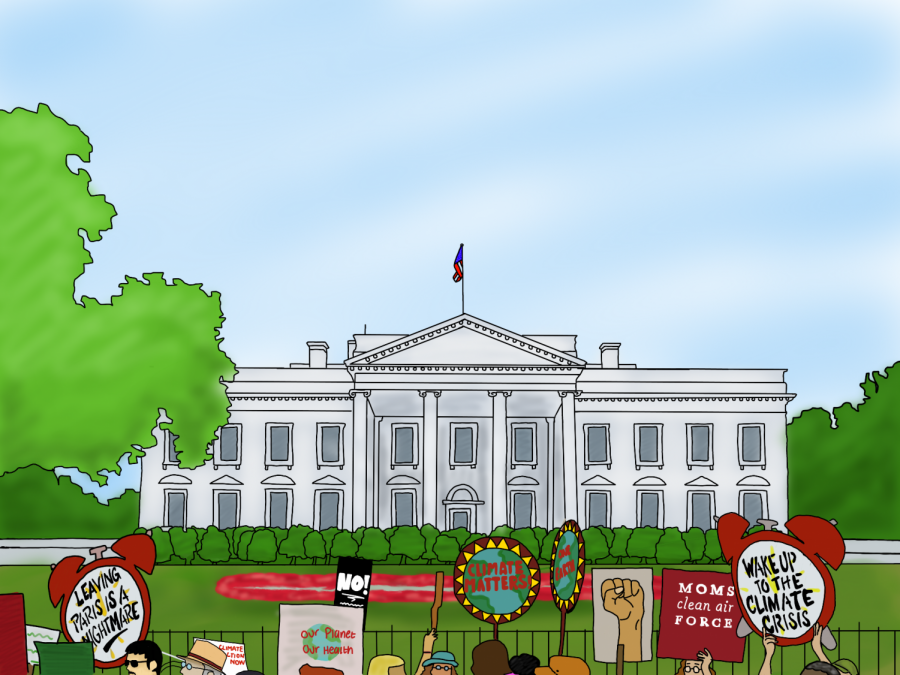Political Climate Heats Up: U.S. and The Paris Climate Accords
February 14, 2020
As the 2020 presidential election approaches, the American people, as well as the rest of the world, are paying attention to where the race is leading us. On the one hand, we have a handful of democratic candidates seeking to overturn the incumbent president and to bring an end to the dissatisfaction that got him elected in 2016, and, on the other hand, we have President Trump running for his second term in office, promising the same bombast and outspokenness that we saw in his first term.
With the recent events going on in Australia and the consistent threat of rising sea levels that is caused, in part, by climate change, the people of the world are looking to their governments for changes that will turn the tide of impending environmental destruction. One of the most progressive steps our governments have collectively made in order to quell the imminent threat is signing the Paris Climate Accords.
The Paris Agreement was drafted in late 2015 and signed by 196 state parties that attended the 2015 Conference of the Parties of the UNFCCC (United Nations Climate Change Conference) in New York. The countries who signed it included the United States, China, Canada, the UK, and Russia, among others. The long term temperature goal of the Paris Climate Accords was to keep the rise in global temperatures well below two degrees Celsius and to aim for keeping the increase at 1.5 degrees Celsius at most.
In order to do this, countries are encouraged to peak their emission levels soon, so that the second half of the 21st century can be dedicated to reducing the output of greenhouse gases. The agreement also wants to make countries more adaptable to the adverse impacts of climate change and financial resources that lower greenhouse gas emissions and “climate resilient development.”
However, in June 2017, President Donald Trump announced that the United States would stop participating in the agreements signed in the Paris Accords. Trump has said that the climate agreement will “undermine the U.S. economy” and “puts the U.S. at a permanent disadvantage”, according to an interview with Fox News.
He mentioned that the withdrawal would be in accordance with his “America First” policy. Part of the Paris Accords’ terms says that signees cannot withdraw before three years of its starting date in that country, which means that the earliest possible withdrawal date for the U.S. would be November 4th, 2020, one day after the 2020 presidential election. Until then, the U.S. will have to continue to comply with the terms under the agreement, such as reporting emission levels to the United Nations.
Response to President Trump’s bold decision has been generally negative. The plan to withdraw has been criticized by businesses, political leaders, environmentalists, and scientists across the political spectrum, according to The Hill. In fact, several governors in the U.S. formed the United States Climate Alliance to continue to implement the standards of the Paris Accords, despite the federal government’s withdrawal. As of July 2019, 24 states and Puerto Rico have joined the alliance.
Leaders in global business like Tesla founder Elon Musk and Lloyd Blankfein of Goldman Sachs have rebutted Trump’s claim that withdrawing would prove beneficial for the U.S. economy – they say that withdrawal will actually hurt the economy by ceding future jobs in clean energy and technology industries to foreign countries.
The impact of this single decision to withdraw will be felt across the country and around the world. Despite how little of a change two degrees Celsius may seem, studies conducted by NPR show that Greenland and Antarctica will start to melt rapidly at that temperature, pushing sea levels up six feet and even more in the future. Moreover, a two-degree change would cause the African continent to heat up substantially, which would “turn Africa into a furnace,’’ said a delegate of the Sudanese government at a series of global climate discussions in Copenhagen in 2009.
Moreover, the U.S.’s withdrawal from the agreement may limit the window for the rest of the world to mitigate the effects of climate change. The next ten years are critical in achieving the goals outlined in the Paris Agreement, and unless there is some unforeseen radical technological development that could somehow replace carbon fuel, carbon emissions must cease rising and begin to decline within this time interval. To achieve this target, fossil fuels will have to decrease to less than 25% of the world’s primary energy supply by the year 2100, according to research done by Walsh and Janssens in 2017.
By withdrawing, the U.S. is also undermining the universality of the climate agreement. It is distinguished from the Kyoto Protocol as being the first global climate change agreement that includes both developed and developing countries. Without one of the world’s most powerful developed countries as part of the agreement, the Paris Accords’ legitimacy will decline. The leadership of the United States, China, and the European Union were key to drafting the Paris Accords – the absence of the US will set a bad precedent for other countries in the Accords, and loosen the strictness of it.
When voting in the 2020 elections, the United States’ membership in the Paris Climate Accords must be considered, due to the obvious adverse impacts that it has on both the environment and the foundations of all our nations and governments.
President Macron of France issued a rather pointed rebuke at President Trump’s decision, saying: “Make our planet great again.” If the United States wants to keep its position as a progressive leader on the world stage and an economic superpower, then our government officials must reconsider our status in the Paris Climate Accords.






























